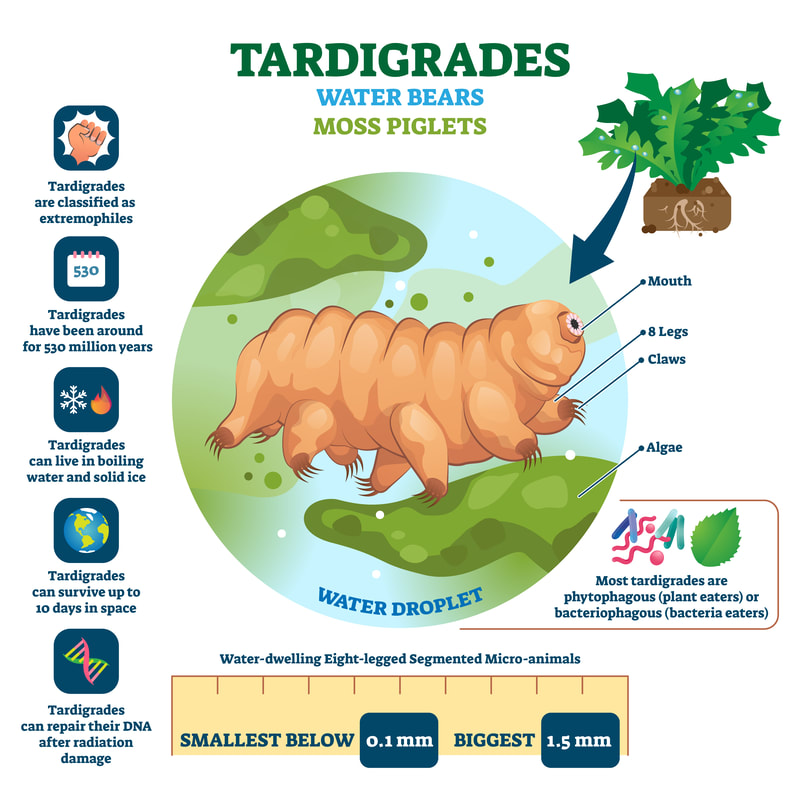ACADEMIC LISTENING TEST PRACTICE
TARDIGRADES
TARDIGRADES
For Students Preparing for Academic Tests / IELTS and TOEFL
Listen as you read the script.
Playing Time: 2 minutes 55 seconds
Tardigrades, sometimes referred to as “water bears”, are microscopic organisms found in almost every type of habitat on Earth, from the highest mountaintops to the depths of the ocean. They are the most resilient and adaptable organisms on Earth and have been around for more than 500 million years.
Tardigrades measure between 0.5 and 1.5 millimeters in size and have four pairs of legs equipped with claws. These creatures have no eyes; instead, they possess a tiny “eye spot” that allows them to detect light and movement. They feed on small organisms such as algae and protozoa, which they suck into their mouths with their sharp claws. Tardigrades live in both aquatic and terrestrial environments, they breathe oxygen and require moisture to survive.
Tardigrades have extraordinary abilities to survive in extreme conditions and are capable of living both in and out of the water for extended periods of time. These hardy creatures can survive intense temperatures including boiling water, absolute zero, intense radiation, extreme dehydration, and even the vacuum of space! This is possible because tardigrades possess defensive proteins which form stiff but flexible proteins called trehalose, providing them with a protective shield from environmental stresses.
Tardigrades can also enter a state of suspended animation called cryptobiosis that allows them to remain in a dormant yet viable state for extended periods of time. When conditions become too inhospitable, they curl up into a protective shell and enter a state of cryptobiosis, with their metabolism slowing to less than 0.01% of its normal rate. This allows them to survive extreme cold, desiccation and other unfavorable conditions that would kill other organisms.
Tardigrades have also been shown to be extremely resistant to radiation, with studies showing that they can survive up to 1,000 times more radiation than other organisms. This resistance to radiation has led some researchers to believe they could be sent to space on missions and even used as robotic life forms.
Tardigrades have always been an enigma, due to the extreme conditions they are able to survive in. Their incredible abilities have left us with more questions than answers about the limits of life, and what we can learn from these tiny creatures. Tardigrades have proven themselves to be one of the most hardy and long-lived organisms on Earth and their secrets still remain to be discovered.
Tardigrades measure between 0.5 and 1.5 millimeters in size and have four pairs of legs equipped with claws. These creatures have no eyes; instead, they possess a tiny “eye spot” that allows them to detect light and movement. They feed on small organisms such as algae and protozoa, which they suck into their mouths with their sharp claws. Tardigrades live in both aquatic and terrestrial environments, they breathe oxygen and require moisture to survive.
Tardigrades have extraordinary abilities to survive in extreme conditions and are capable of living both in and out of the water for extended periods of time. These hardy creatures can survive intense temperatures including boiling water, absolute zero, intense radiation, extreme dehydration, and even the vacuum of space! This is possible because tardigrades possess defensive proteins which form stiff but flexible proteins called trehalose, providing them with a protective shield from environmental stresses.
Tardigrades can also enter a state of suspended animation called cryptobiosis that allows them to remain in a dormant yet viable state for extended periods of time. When conditions become too inhospitable, they curl up into a protective shell and enter a state of cryptobiosis, with their metabolism slowing to less than 0.01% of its normal rate. This allows them to survive extreme cold, desiccation and other unfavorable conditions that would kill other organisms.
Tardigrades have also been shown to be extremely resistant to radiation, with studies showing that they can survive up to 1,000 times more radiation than other organisms. This resistance to radiation has led some researchers to believe they could be sent to space on missions and even used as robotic life forms.
Tardigrades have always been an enigma, due to the extreme conditions they are able to survive in. Their incredible abilities have left us with more questions than answers about the limits of life, and what we can learn from these tiny creatures. Tardigrades have proven themselves to be one of the most hardy and long-lived organisms on Earth and their secrets still remain to be discovered.
Note: For more cool ESL resources about animals, visit my All Things Topics site.


